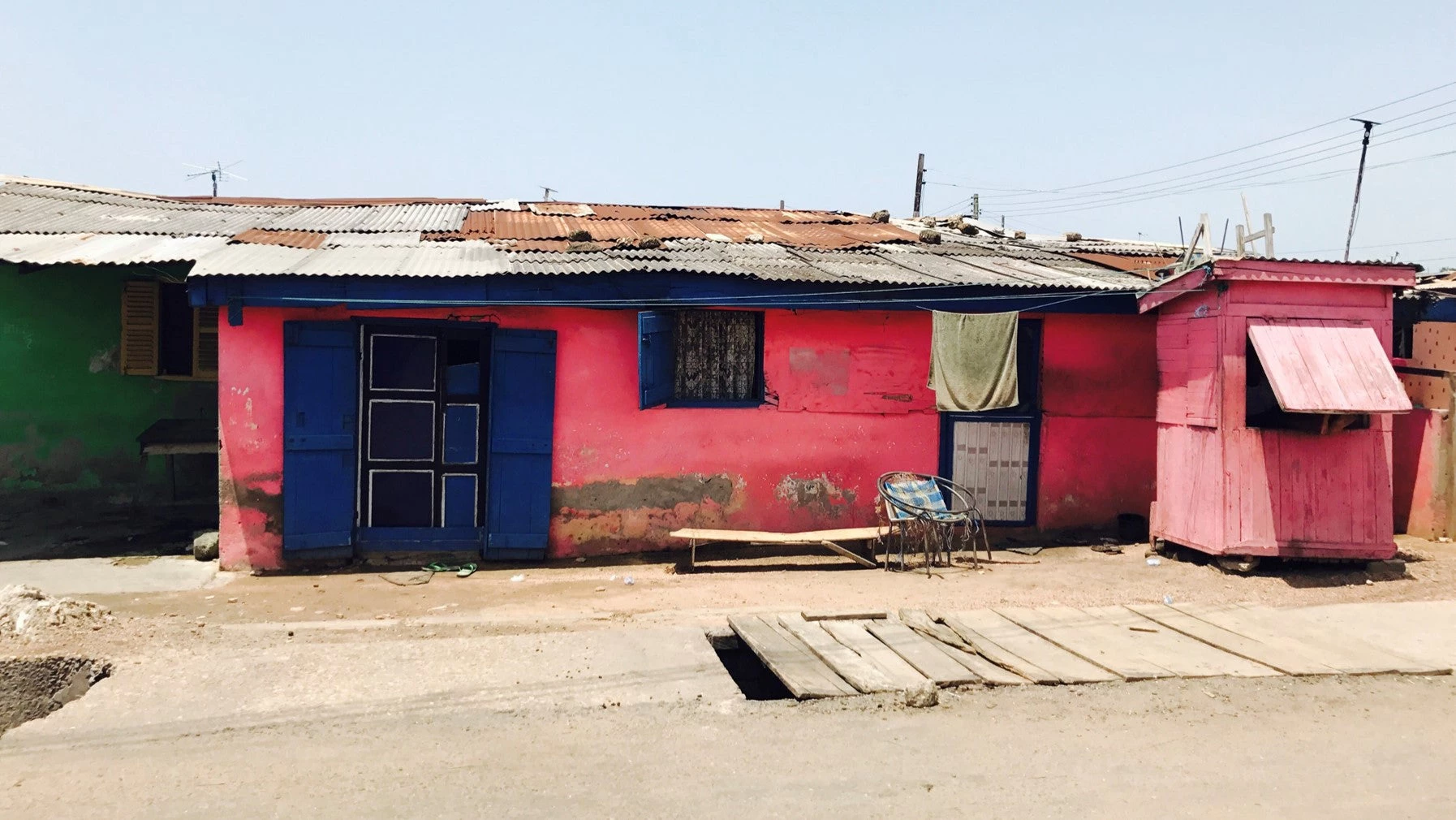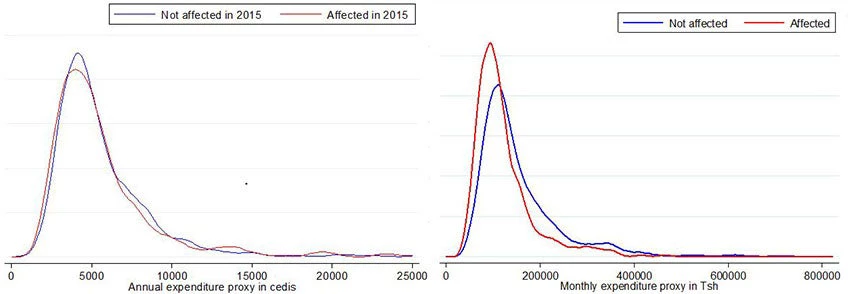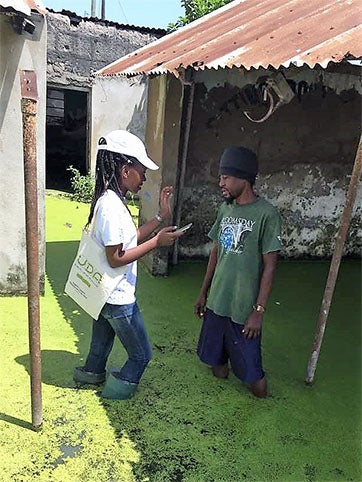 Photo of a household in Ghana
Photo of a household in Ghana
How do floods affect people, especially the poorer population, living in flood-prone areas? What attracts them to settle in these areas and how do they cope with the impacts of floods?
These are the questions that the Disaster Poverty Household Survey (DHPS) was designed to answer for city officials looking for answers. The survey instrument evaluates the relationship between poverty and flood risk in cities and is a collaborative effort involving the Global Facility of Disaster Reduction and Recovery (GFDRR), and the World Bank’s poverty and urban resilience practice groups. Since its initiation in 2017, the DHPS has been applied in Brazil (Porto Alegre), Ethiopia (Addis Ababa and Dire Dawah), Ghana (Accra), Haiti (Cap-Haïtien), and Tanzania (Dar es Salaam). The data has helped us understand better how floods impact communities, beyond the aggregate value of damages and losses that are usually published in the media after flood events, and can be used to carry out policy relevant research on climate change adaptation, urbanization, urban poverty, and more.
The DHPS datasets from Accra, Addis Ababa and Dire Dawah, Dar es Salaam and Cap-Haïtien were recently published on the World Bank’s Microdata Library and are publicly accessible to licensed users.
Below are the three main findings from the surveys:
- While richer and poorer people alike tend to be affected by high-intensity flood events, poorer people are more likely to be impacted by smaller, more frequent flood occurrences. When asked about exposure to specific large flood events, poorer and richer households were equally likely to be affected (such as in Accra). When asked about exposure to any flood, such as in Cap-Haïtien and Dar es Salaam, poor people were more likely to be affected.
Figure 1. Income-proxy distribution for affected (red line) and non-affected (blue line) populations in Accra, Ghana and Dar es Salaam, Tanzania.

Source: Erman, et al. 2018 and Erman, et al., 2019.
- Poorer people are attracted to flood-prone areas by cheap housing and accessibility to jobs. The data shows that households experiencing higher flood risk pay 14 to 56 percent lower rents in Accra and Addis Ababa. In some cities, affected households live closer to jobs. In Dar es Salaam, income earners that have been affected by flooding at least once, live 13 minutes closer to work than those that have not been affected. And those who have been affected more than once live over 25 minutes closer to work than those unaffected by floods. Access to jobs is indeed a driver for households settling in flood-prone areas. In cities like Accra and Addis Ababa, where areas with high job density are not the most attractive, reflected in lower rent values, rents are even lower when both job density and flood risk are high. This result indicates that poorer households accept flood risk to be able to afford living closer to jobs.
- While poverty delays recovery in most cities, access to a stable source of income such as formal and informal financing, and community-saving groups, matters more. Poorer people were less likely to have recovered quickly from flooding in Dar es Salam, and in Cap-Haïtien, they were less likely to have found jobs and access to resumed services, such as sanitation. In Accra, higher income was not associated with faster recovery. Instead, the size of losses mattered more. In both Accra and Dar es Salaam, access to more stable sources of income, access to bank account, informal lending, and remittances from friends and family were associated with faster recovery after flooding. In Dar es Salaam, membership in community saving groups, especially the ones focused on income-generating activities and access to more secure tenure also supports recovery.

In sum, poverty is closely linked to higher flood risk in cities in developing countries. Poverty drives vulnerability to flooding in different ways, from increased risk of exposure to flooding to lower access to coping mechanisms that can support recovery. But not all poor people are equally affected or affected in the same way. Factors such as the source of income the family relies on, access to finance, both formal and informal, as well as tenure arrangements matter as well.
If you are looking to understand flood risk and poverty better in your city, the DHPS can help you get started. All questionnaires are available to download on the Microdata Library alongside the datasets. Also included are technical notes detailing sampling methods and use of the Survey of Well-being via Instant and Frequent Tracking (SWIFT) methodology, which captures the poverty status of households.
Datasets in Microdata Library:
Disaster Poverty Household Survey 2018, Cap-Haïtien
https://microdatalib.worldbank.org/index.php/catalog/13028
Disaster Poverty Household Survey 2017, Addis Ababa and Dire Dawa
https://microdata.worldbank.org/index.php/catalog/4544
Disaster Poverty Household Survey 2017, Accra
https://microdatalib.worldbank.org/index.php/catalog/13069
Disaster Poverty Household Survey 2017-2018, Dar es Salaam
https://microdata.worldbank.org/index.php/catalog/4545
Papers linked to datasets:
Erman, Alvina; Dallmann, Ingrid. 2022. Putting a Price on Safety : A Hedonic Price Approach to Flood Risk in African Cities. Policy Research Working Papers;10127. World Bank, Washington, DC. https://openknowledge.worldbank.org/handle/10986/37754
Erman, Alvina; Tariverdi, Mercedeh; Obolensky, Marguerite; Chen, Xiaomeng; Vincent, Rose Camille; Malgioglio, Silvia; Rentschler, Jun; Hallegatte, Stephane; Yoshida, Nobuo. 2019. Wading Out the Storm : The Role of Poverty in Exposure, Vulnerability and Resilience to Floods in Dar es Salaam. Policy Research Working Paper;No. 8976. World Bank, Washington, DC. https://openknowledge.worldbank.org/handle/10986/32269
Erman, A., Motte, E., Goyal, R. et al. The Road to Recovery the Role of Poverty in the Exposure, Vulnerability and Resilience to Floods in Accra. EconDisCliCha 4, 171–193 (2020). https://doi.org/10.1007/s41885-019-00056-w


Join the Conversation